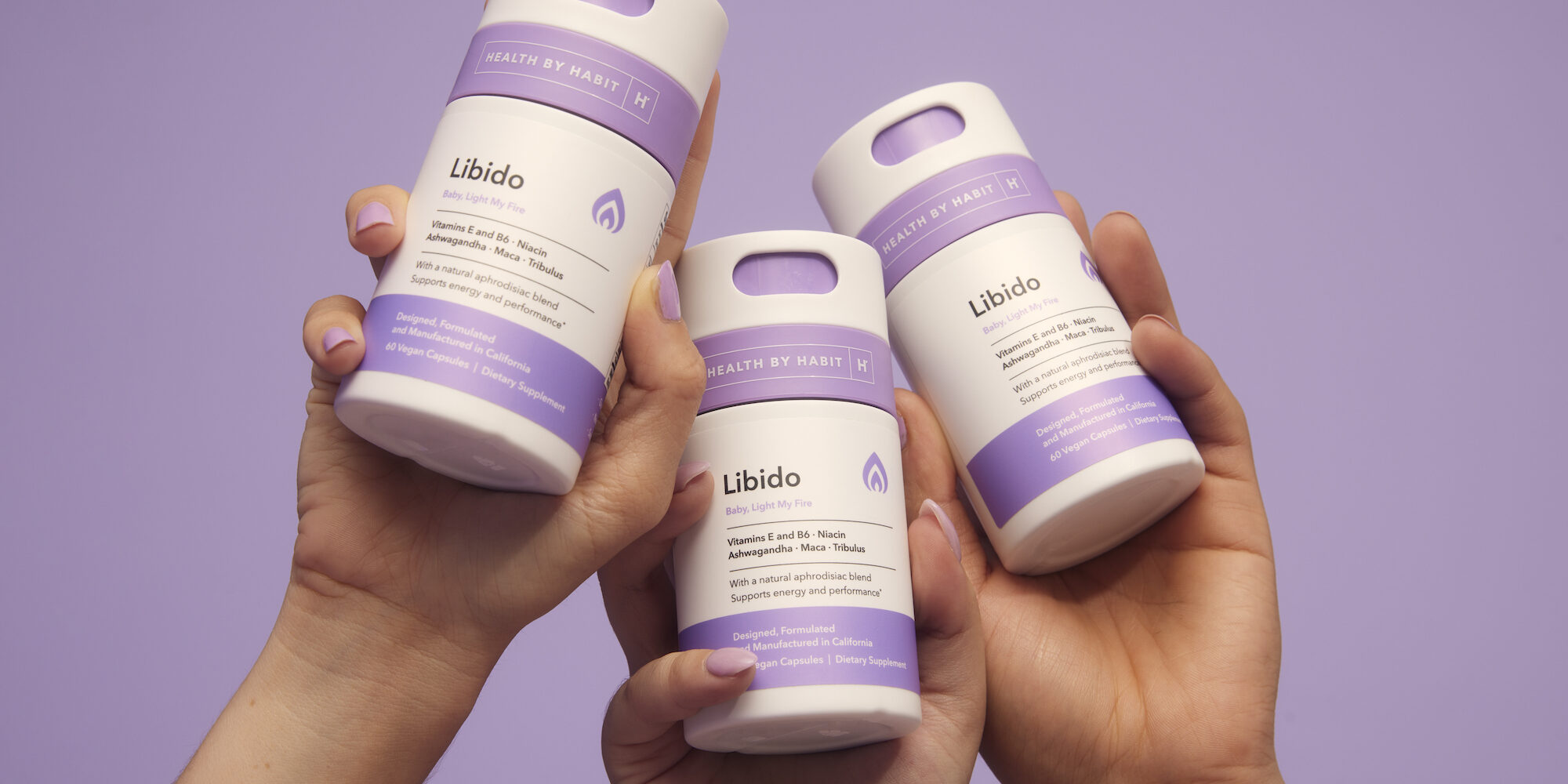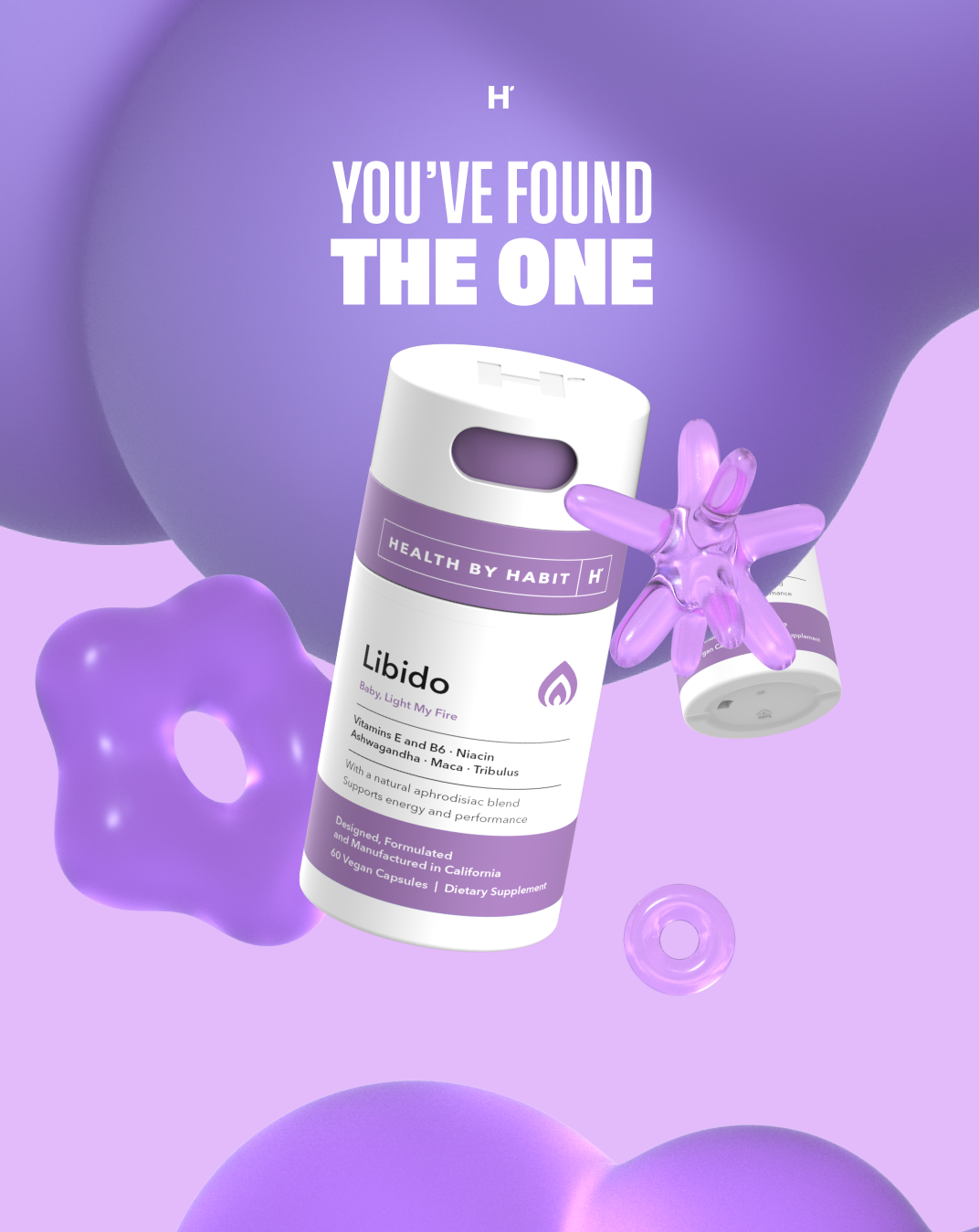
For Its Target Debut, Supplement Brand Health By Habit Gets Cheeky With Marketing To Support New Libido Offering
Zuru Edge-owned supplement brand Health by Habit has entered Target stores nationwide with six of the brand’s eleven products each priced at $8.99: Men’s Multivitamin, Women’s Multivitamin, Energy, Collagen, Stress Relief and Libido. A seventh supplement, Hair Skin & Nails, priced at $8.89, is available only online.
Libido is a new offering from Health by Habit that’s a key component of the partnership. The gender-inclusive herbal offering coincides with Target’s recent ambitious push into sexual wellness and is formulated with maca, a natural aphrodisiac, as well as vitamins E and B6, ashwagandha, ginseng, niacinamide and tribulus to support stamina and performance. Libido is exclusive to Target.
Health by Habit kicked off in June 2021 with a rollout across Walmart’s store network and an arrival on the massive chain’s website. When customers click “shop now” on Health by Habit’s website, they’re redirected to Walmart’s e-commerce site. At the big-box merchant, Health by Habit sells a deluxe 200-count version of its men’s multivitamin along with its other products. As is standard with many emerging brands at Walmart, Health by Habit’s prices there are slightly discounted. Specifically, at Walmart, its supplements are $8.88 versus $8.99 at Target.
Although Health by Habit has landed at Target less than a year after its Walmart launch, the brand’s approach to its Target debut differed from its Walmart premiere. Health by Habit marketing manager Ally Rodwell says, “Walmart was not just a product launch for us, it was also a brand launch, so it was a huge deal. We were a little New Zealand brand who managed to get full distribution across Walmart stores in the U.S. We really worked hard to make ourselves seen.”
She continues, “Being able to launch into Target now is a combination of what we feel is the success of the Walmart launch and then the introduction of new products into our assortment. In terms of launching into Target, Libido has been a great entry point for us, not only because it’s exclusive to the retailer, but it also fits within the emphasis that Target is putting on the sexual wellness category as a whole.”
Zuru Edge, a subsidiary of toy company Zuru with the brands Monday and Dose & Co. in its portfolio along with Health by Habit, has quickly become known for inventive influencer strategies tapping influencers with large, as well as more niche, audiences who are unconventional for beauty and wellness. Because of the nature of Libido, Rodwell says that Health by Habit has been “a little naughtier” with its marketing than it was previously with its Walmart launch. However, she notes the brand’s overarching theme of democratizing wellness by ensuring products are “accessible at all touch points, be it by retailer or price” remains unchanged.

Zuru Edge has relied heavily on TikTok to drive awareness and sales, but the platform’s policy prohibits Health by Habit, as a supplement brand, from working with paid influencers on content. To get around that, the brand relies on product seeding, or giving out gratis product to influencers and consumers with audiences in Health by Habit’s target demographic in hopes that they post content featuring the products. Additionally, the team leaned on its in-house content creation capabilities for TikTok. For Libido, its in-house designer spent hours on two particular videos, according to Rodwell. She says, “Basically, the brief was to simulate an orgasm. They are incredible. We want to test how they perform on Health by Habit’s digital platforms.”
To encourage this type of experimentation, the brand earmarks 5% of its digital advertising spend to out-of-the-box ideas. She explains, “It encourages us to think about our traditional approaches in the digital space and try to look at something a bit more obscure or outside of what we normally do. With the way things are evolving in the digital space, we need to be constantly looking to make sure that we are following those trends.”
Under the auspices of that 5%, a Times Square billboard will feature a large Libido bottle with a QR code on it that takes initiates Marvin Gaye music once it’s scanned. Health by Habit is also experimenting with paid ads on dating app Tinder with copy like, “You’ve found the one.” Rodwell says the untraditional tactics “haven’t been hugely costly, but are quite a fun, playful way to expand our audience and have a good time with sex.”
Early sales figures for Libido are promising. Health by Habit quietly soft launched its products on Target’s website at the end of March, and Libido has already emerged as a standout stockkeeping unit for the brand. Without a marketing push, Liam Whittaker, product and operations director at Zuru Edge, discloses it’s promptly become Health by Habit’s second-most productive stockkeeping unit on a weekly unit per store basis.
“We’re a female wellness brand, and our Woman’s Multi always sells the best whatever store we go to,” he says. “Our second-best SKU behind Women’s Multi is our Libido product in Target two weeks in before we’ve started marketing. It gives us really optimistic signs in terms of hitting the right trend with the right customer that resonates, and marketing is only going to drive that more so.”
Last Friday, Health by Habit started teasing Libido’s launch on its social platforms. This week, the brand will officially announce the product and unveil content tied to it by sex-positive writer and documentary series “Slutever” host Karley Sciortino. Rodwell describes the content as having a more “face-to-camera, authentic feeling” than Health by Habit’s prior campaign called Creatures of Habit timed with its Walmart launch featuring macro-influencers like Niamh Adkins, a model boasting 1 million followers on Instagram and 2 million followers on TikTok.
For Zuru Edge, micro- and nano-influencers will remain a strong focus going forward. “With them, we’re able to garner a much wider reach, and we find that audiences are a bit more captive and a bit more engaged,” says Whittaker. “And it feels really authentic to be working with people who are there to create more lo-fi content and generally are more interested in the brand as a whole.”





Leave a Reply
You must be logged in to post a comment.